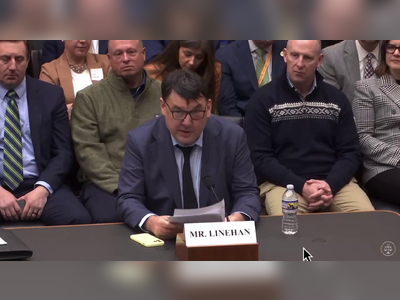
Ceasefire in Gaza at Risk as Israel Demands Hostage Release from Hamas
Israeli Prime Minister Benjamin Netanyahu warns that fighting will resume if Hamas does not comply with the terms of a fragile ceasefire deal amidst escalating tensions.
Israeli Prime Minister Benjamin Netanyahu has issued a stark warning that the ongoing ceasefire with Hamas may come to an end if the militant group does not release hostages held in Gaza by Saturday.
This statement follows Hamas's announcement that it would postpone the release of more hostages, alleging that Israel had violated the terms of their three-week-old ceasefire agreement.
The details on the specific hostages in question remain uncertain, with Netanyahu's demands seemingly focusing on either the three hostages scheduled for release this weekend or potentially all 76 still in captivity.
In response to Hamas's decision, the Israeli security cabinet convened to discuss the situation.
Following the meeting, Netanyahu stated in a video that he had instructed the Israel Defense Forces (IDF) to gather forces inside and around Gaza, indicating that this operation was already underway.
He emphasized that if hostages are not returned by noon on Saturday (10:00 GMT), Israel would revert to intense military action against Hamas.
The cabinet reportedly reached a unanimous decision on this course of action.
Hamas, while asserting its commitment to the ceasefire, has countered by holding Israel accountable for any delays or issues that may arise, including alleged impediments to the return of displaced Palestinians to northern Gaza and obstructed humanitarian aid deliveries.
A senior member from Hamas indicated willingness to cooperate with U.S., Qatari, and Egyptian mediators to ensure the deal proceeds as planned.
The ceasefire agreement has seen 16 hostages returned since it came into effect on January 19, although questions remain regarding the status of several others, particularly with respect to the group of 33 hostages expected to be exchanged for around 1,900 Palestinian detainees.
Parallel to these developments, former U.S. President Donald Trump prompted further controversy by advocating for Israel to abandon the ceasefire unless all hostages were released.
Trump's remarks, which included a proposal for the U.S. to assume control of Gaza post-conflict and resettle its Palestinian population, received widespread criticism and were rejected by both Hamas and numerous international actors, including the Palestinian Authority and Arab nations, who have cautioned against potential ethnic cleansing.
The humanitarian situation in Gaza remains dire; extensive damage has been reported, with rising numbers of fatalities and widespread displacement due to ongoing conflicts since October 2023. The UN has warned that significant international aid and a comprehensive reconstruction plan will be necessary, with estimates of the rebuilding costs exceeding $50 billion over the next decade.
Upcoming negotiations regarding the second phase of the ceasefire agreement are anticipated to cover the release of the remaining hostages, a full Israeli troop withdrawal, and the establishment of a permanent ceasefire.
However, resistance to these negotiations exists within Netanyahu's coalition government, increasing the stakes for both sides involved.
As tension mounts, observers continue to watch for any shifts in the fragile diplomatic landscape.
This statement follows Hamas's announcement that it would postpone the release of more hostages, alleging that Israel had violated the terms of their three-week-old ceasefire agreement.
The details on the specific hostages in question remain uncertain, with Netanyahu's demands seemingly focusing on either the three hostages scheduled for release this weekend or potentially all 76 still in captivity.
In response to Hamas's decision, the Israeli security cabinet convened to discuss the situation.
Following the meeting, Netanyahu stated in a video that he had instructed the Israel Defense Forces (IDF) to gather forces inside and around Gaza, indicating that this operation was already underway.
He emphasized that if hostages are not returned by noon on Saturday (10:00 GMT), Israel would revert to intense military action against Hamas.
The cabinet reportedly reached a unanimous decision on this course of action.
Hamas, while asserting its commitment to the ceasefire, has countered by holding Israel accountable for any delays or issues that may arise, including alleged impediments to the return of displaced Palestinians to northern Gaza and obstructed humanitarian aid deliveries.
A senior member from Hamas indicated willingness to cooperate with U.S., Qatari, and Egyptian mediators to ensure the deal proceeds as planned.
The ceasefire agreement has seen 16 hostages returned since it came into effect on January 19, although questions remain regarding the status of several others, particularly with respect to the group of 33 hostages expected to be exchanged for around 1,900 Palestinian detainees.
Parallel to these developments, former U.S. President Donald Trump prompted further controversy by advocating for Israel to abandon the ceasefire unless all hostages were released.
Trump's remarks, which included a proposal for the U.S. to assume control of Gaza post-conflict and resettle its Palestinian population, received widespread criticism and were rejected by both Hamas and numerous international actors, including the Palestinian Authority and Arab nations, who have cautioned against potential ethnic cleansing.
The humanitarian situation in Gaza remains dire; extensive damage has been reported, with rising numbers of fatalities and widespread displacement due to ongoing conflicts since October 2023. The UN has warned that significant international aid and a comprehensive reconstruction plan will be necessary, with estimates of the rebuilding costs exceeding $50 billion over the next decade.
Upcoming negotiations regarding the second phase of the ceasefire agreement are anticipated to cover the release of the remaining hostages, a full Israeli troop withdrawal, and the establishment of a permanent ceasefire.
However, resistance to these negotiations exists within Netanyahu's coalition government, increasing the stakes for both sides involved.
As tension mounts, observers continue to watch for any shifts in the fragile diplomatic landscape.











